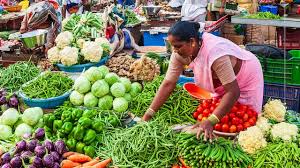Top Stories
Retail Inflation Hits Six-Year Low of 2.1% in June 2025

Headline retail inflation in India has fallen to a six-year low of 2.1% in June 2025, providing significant relief to consumers. This decline is primarily attributed to lower prices of essential food items, including vegetables, pulses, meat, and milk. Concurrently, wholesale price inflation (WPI) also dipped into negative territory for the first time in 19 months, registering a decline of 0.13% in June, driven by reduced costs in food and fuel.
According to data from the National Statistics Office (NSO), the consumer price index (CPI) showed inflation at 2.82% in May 2025 and 5.08% in June 2024. The significant drop in inflation is noteworthy, with 1.97% being the previous low recorded in January 2019. The government highlighted that the decrease in both headline and food inflation during June was largely due to a favorable base effect and falling prices in various food categories.
Economic Insights from Industry Experts
Aditi Nayar, chief economist at ICRA Ltd, emphasized that the cooling inflation was predominantly driven by the food and beverages sector, marking a shift after 75 months of higher rates. She noted that deflation was evident in 11 out of 12 sub-categories, including significant reductions in prices for vegetables, pulses, spices, and meat.
Despite this positive trend, Nayar expressed concerns regarding potential adverse weather conditions, such as heavy rainfall and flooding, which could impact crop yields and ultimately affect food prices.
Looking ahead, inflation in food prices has shown a seasonal increase in July 2025, although it remains less severe compared to the same period last year, particularly for vegetables.
Wholesale Price Inflation Trends
In terms of wholesale inflation, June marked a significant shift as it turned negative, with a 0.13% decline reported. This shift follows a 0.39% increase in May and a 3.43% rise in the same month last year. The industry ministry’s data revealed a notable deflation of 3.75% in food articles, which is a considerable change from the 1.56% deflation recorded in May. Notably, vegetables saw a 22.65% deflation in June compared to 21.62% in May.
The ministry stated that the negative inflation rate in June was primarily due to decreased prices in food articles, mineral oils, and the manufacturing of basic metals, alongside crude petroleum and natural gas. In the manufactured products category, inflation stood at 1.97%, slightly down from 2.04% in May. Furthermore, the fuel and power sector experienced deflation of 2.65% in June, compared to 2.27% in the previous month.
Hemant Jain, president of the PHD Chamber of Commerce and Industry (PHDCCI), remarked that the continuous decline in WPI inflation over seven months is encouraging for India’s economic growth. He anticipates that, considering the rise in domestic demand, expectations of a normal monsoon, and robust overall economic activity, WPI inflation will remain moderate in the upcoming months, despite ongoing geopolitical uncertainties.
The data released indicates a positive economic outlook, suggesting that consumers may continue to benefit from lower prices in essential goods as inflation trends evolve.
-

 World7 months ago
World7 months agoSBI Announces QIP Floor Price at ₹811.05 Per Share
-

 Lifestyle7 months ago
Lifestyle7 months agoCept Unveils ₹3.1 Crore Urban Mobility Plan for Sustainable Growth
-

 Science6 months ago
Science6 months agoNew Blood Group Discovered in South Indian Woman at Rotary Centre
-

 World7 months ago
World7 months agoTorrential Rains Cause Flash Flooding in New York and New Jersey
-

 Top Stories7 months ago
Top Stories7 months agoKonkani Cultural Organisation to Host Pearl Jubilee in Abu Dhabi
-

 Science7 months ago
Science7 months agoNothing Headphone 1 Review: A Bold Contender in Audio Design
-

 Sports6 months ago
Sports6 months agoBroad Advocates for Bowling Change Ahead of Final Test Against India
-

 Top Stories7 months ago
Top Stories7 months agoAir India Crash Investigation Highlights Boeing Fuel Switch Concerns
-

 Business7 months ago
Business7 months agoIndian Stock Market Rebounds: Sensex and Nifty Rise After Four-Day Decline
-

 Sports6 months ago
Sports6 months agoCristian Totti Retires at 19: Pressure of Fame Takes Toll
-

 Politics7 months ago
Politics7 months agoAbandoned Doberman Finds New Home After Journey to Prague
-

 Top Stories7 months ago
Top Stories7 months agoPatna Bank Manager Abhishek Varun Found Dead in Well









